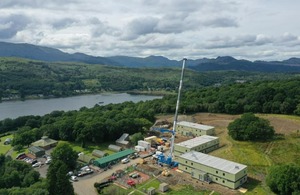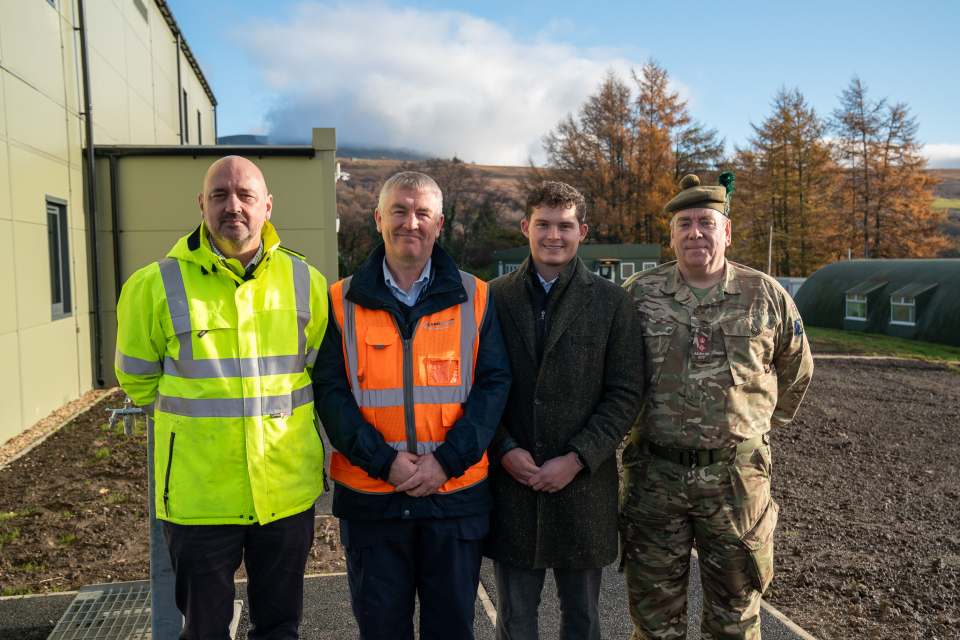First carbon neutral accommodation buildings in Scotland to support operational training
The MOD’s award-winning Net-Zero Carbon Accommodation Programme (NetCAP) has reached another key milestone by delivering the first NetCAP buildings on the UK Defence Training Estate (DTE) in Scotland.

An aerial view of the new NetCAP buildings on Greenfield Camp at Garelochhead. (Crown copyright MOD 2023).
The first of many NetCAP buildings to be completed at Greenfield Camp in Garelochhead will bring high-quality, versatile and sustainable accommodation to support service personnel as they train for operations worldwide.
The buildings were delivered by the MOD’s Defence Infrastructure Organisation (DIO), working with industry partner Landmarc Support Services (Landmarc) and off-site construction specialist Reds10. The accommodation was designed and constructed in Reds10’s East Yorkshire factory before being transported to site.
The first phase of delivery was completed this month, with 51 units combined on site to make up three double-storey accommodation blocks that provide 315 bedspaces. The blocks replace several Nissen huts which were built around 1944 to house troops prior to deployment during WW2, and were retained for training accommodation ever since. The fourth and final accommodation block will be completed by early 2024.

Peter Gentles, DIO Senior Estate Facilities Manager, Ronnie Shields, Landmarc Senior Project Manager, Tom Hook, Reds10 Associate Director & Defence PM Lead, and Lt Col Robert Lockhart of the Argyle and Sutherland Highlanders Battalion Army Cadet Force showcase one of the new buildings. (Crown copyright MOD 2023).
Brigadier Jonathan Bartholomew, DIO’s Head of Overseas and Training Region, said:
We are delighted to see the installation of these modern accommodation blocks in Greenfield Camp in Garelochhead. It demonstrates the MOD’s commitment to delivering high-quality accommodation for our serving personnel, which helps them to give their best during their training exercises.
These blocks, and the wider NetCAP programme are also a testament to the MOD’s commitment to sustainability.
The NetCAP buildings have a Defence Related Environmental Assessment Methodology (DREAM) rating of ‘excellent’ and provide new sustainable accommodation which can be subdivided as necessary. They also include showers, ablutions and drying rooms all in one modern complex, removing the need for troops to move around different buildings.
A variety of innovative green measures have been implemented across NetCAP to ensure long-term operational efficiency. These include solar panels on the roof, air source heat pumps, a rainwater harvesting system and a heat recovery system in the showers and drying rooms. This means the buildings will be able to generate power for the site, reducing electricity costs.
NetCAP has delivered the DTE’s first carbon negative buildings, including these ones in Garelochhead, and equips them with SMART building technology that optimises energy use and provides data for improvement, saving energy and reducing maintenance costs. This data was used to drive down Energy Performance Certificate (EPC) ratings from 12 to -10 during the early stages of the programme, and an embodied carbon saving of 9,100 tonnes across the programme.
Mark Neill, Managing Director at Landmarc, said:
We are committed to supporting the MOD and DIO with their net zero carbon goals, and this first for Scotland is another example of how we’re driving down carbon by improving building standards across the DTE.
Not only is this investment helping to deliver a more sustainable estate, but it also supports the government’s aim to improve living accommodation for our armed forces, whilst investing in the economy by using an end-to-end UK supply chain.
Phil Cook, Director & Defence Sector Lead of Reds10, said:
We are delighted to be bringing NetCAP to Scotland, alongside DIO and Landmarc. In just 18 weeks on site, the combined team has delivered three double-storey buildings with a fourth to be completed soon after. The use of Modern Methods of Construction (MMC) has meant that units arrive on site up to 90% complete, minimising disruption to a key site on the DTE.
Once complete, the new facilities programme at Garelochhead will deliver four double-accommodation blocks on site, and offer a total of 416 new bed spaces for serving troops, cadets and other members of our armed forces and MOD Police during annual training in Scotland.